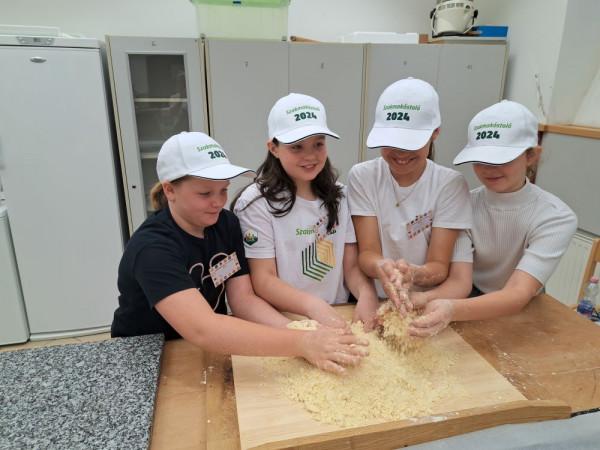The “Professional Taster” career orientation program weeks were a great success
The National Chamber of Agrarian Economy (NAK) considers the promotion of agricultural professions, informing young people choosing careers and their parents, and promoting enrollment in agricultural vocational training institutions to be a priority task. As part of this, in the summer of 2024, 380 elementary school students in 19 agricultural vocational training institutions were given the opportunity to gain an interactive insight into the mysteries, work processes, and school life of agricultural professions within the framework of the career orientation program weeks “Szakmakóstoló”.

(Photo: NAK)
According to experience, the experience-based, playful knowledge acquisition appeals most to 6th, 7th and 8th grade students who want to learn about agricultural professions. This was also the case during the “Vocational Taster” career guidance program weeks organized with the support of NAK for the seventh year, where the vocational training institutions welcomed the children with high-quality presentations and programs, who in groups of 20 “tasted” the agricultural professions offered by the given school. Each year, the NAK primarily enrolls in the program students who are about to choose a career, who love nature, animals, plants, and are interested in agricultural professions, thus providing them with the opportunity to make a conscious career choice and continue their education in agricultural vocational training.
This year, the thematic program weeks took place between June 24 and August 16, covering the entire country, on a walk-in basis
The programs were implemented in a practical environment, in a total of 19 agricultural vocational training institutions, with the involvement of 65 successful entrepreneurs and businesses working in agriculture. The elementary school students were guided in groups of 20 people and actively involved in the individual work processes. In addition, they were able to get to know the vocational training institution hosting the program week and its teaching farm and workshop, in which the given profession is also taught. The students were able to get to know the work processes related to plant growing and animal husbandry, such as the preparation of animal feed, the animals living around the house, which are also bred within the framework of a gene preservation program. They got acquainted with the recognition of different grain seeds and the measurement of the weight of a thousand seeds, the rules for entering the livestock farm, the development process of grapes, the characteristics of each grape variety and the methods of pruning, and they also saw a drone machine demonstration. They gained an insight into the intricacies of food preparation (making yeast dough, shaping, filling and decorating products after baking, using pressure bags, knives and cutters, tempering chocolate, examining different cocoa beans, meat processing, sausage making, etc.). They were able to learn about the mysteries of agricultural machinery, try dialing, get to know the structure of the training tractor, its driving steps, its operation, and the joy of driving. In addition, they were able to acquire knowledge of forestry and wildlife management: they could study lowland forestry and wildlife management, evergreen forest management, the possibilities of reducing climate change, the effects of weather change on native plants, and how much effort is needed to encounter forests even in poorer quality areas . They also acquired gardening knowledge, learned about kitchen garden plants, planted seedlings, saw the automatic potting machine and different ways of propagating plants, and created their own garden plans with 3D visualizations using garden planning software. They were able to try out the leveling instrument, and practice the individual steps of garden construction with paving stones and bricks, as well as soil sampling and simpler soil testing methods.
In addition to playful professional knowledge and practical demonstrations, students could compare their knowledge gained during the day in competitions and synthesizing quiz games
At the end of the program week, parents were also invited, to whom NAK’s county vocational training officers presented the continuing education opportunities of agriculture, as well as student allowaThe “Professional Taster” career orientation program weeks were a great success. The National Chamber of Agrarian Economy (NAK) considers the promotion of agricultural professions, informing young people choosing careers and their parents, and promoting enrollment in agricultural vocational training institutions to be a priority task. As part of this, in the summer of 2024, 380 elementary school students in 19 agricultural vocational training institutions were given the opportunity to gain an interactive insight into the mysteries, work processes, and school life of agricultural professions within the framework of the career orientation program weeks “Szakmakóstoló”.
According to experience, the experience-based, playful knowledge acquisition appeals most to 6th, 7th and 8th grade students who want to learn about agricultural professions. This was also the case during the “Vocational Taster” career guidance program weeks organized with the support of NAK for the seventh year, where the vocational training institutions welcomed the children with high-quality presentations and programs, who in groups of 20 “tasted” the agricultural professions offered by the given school. Each year, the NAK primarily enrolls in the program students who are about to choose a career, who love nature, animals, plants, and are interested in agricultural professions, thus providing them with the opportunity to make a conscious career choice and continue their education in agricultural vocational training.
This year, the thematic program weeks took place between June 24 and August 16, covering the entire country, on a walk-in basis
The programs were implemented in a practical environment, in a total of 19 agricultural vocational training institutions, with the involvement of 65 successful entrepreneurs and businesses working in agriculture. The elementary school students were guided in groups of 20 people and actively involved in the individual work processes. In addition, they were able to get to know the vocational training institution hosting the program week and its teaching farm and workshop, in which the given profession is also taught. The students were able to get to know the work processes related to plant growing and animal husbandry, such as the preparation of animal feed, the animals living around the house, which are also bred within the framework of a gene preservation program. They got acquainted with the recognition of different grain seeds and the measurement of the weight of a thousand seeds, the rules for entering the livestock farm, the development process of grapes, the characteristics of each grape variety and the methods of pruning, and they also saw a drone machine demonstration. They gained an insight into the intricacies of food preparation (making yeast dough, shaping, filling and decorating products after baking, using pressure bags, knives and cutters, tempering chocolate, examining different cocoa beans, meat processing, sausage making, etc.). They were able to learn about the mysteries of agricultural machinery, try dialing, get to know the structure of the training tractor, its driving steps, its operation, and the joy of driving. In addition, they were able to acquire knowledge of forestry and wildlife management: they could study lowland forestry and wildlife management, evergreen forest management, the possibilities of reducing climate change, the effects of weather change on native plants, and how much effort is needed to encounter forests even in poorer quality areas . They also acquired gardening knowledge, learned about kitchen garden plants, planted seedlings, saw the automatic potting machine and different ways of propagating plants, and created their own garden plans with 3D visualizations using garden planning software. They were able to try out the leveling instrument, and practice the individual steps of garden construction with paving stones and bricks, as well as soil sampling and simpler soil testing methods.
In addition to playful professional knowledge and practical demonstrations, students could compare their knowledge gained during the day in competitions and synthesizing quiz games
At the end of the program week, parents were also invited, to whom NAK’s county vocational training officers presented the continuing education opportunities of agriculture, as well as student allowances and dual training opportunities available in vocational training.
These were the professions presented during the program weeks this year
Agricultural technician/ Animal breeder and Crop grower professional degrees; Horticultural technician/ Ornamental plant grower, florist, Medicinal plant grower, Fruit grower, Vegetable grower, Park construction and maintenance professional rates; Farmer/Livestock Breeder, Crop Grower, Horseman professional rates; Forestry Technician/Forest Management and Wildlife Management professional rates; Agricultural mechanical technician; Agricultural machinist; Butcher and meat preparation maker; Baker; Baker-confectioner; Confectioner, baking and confectionery technician with prospects; Small-scale food producer.
NAK closes the “Professional Taster” program weeks in the fall of each year with a national competition among the participating students
The topic of this is why it is good to choose an agricultural career during further education. As a “career orientation student ambassador”, the first-placed student can take his entire class to an agricultural professional day, during which students who do not participate in the career orientation programs can also gain an insight into the world of agricultural professions. Based on the feedback, 95% of the students were happy to participate in the program week, which helps them in their future career choices. In general, 70% of the children said that the profession they learned about during the “Profession Taster” week will be included in their further education plans.
NAK
Related news
Related news
Amikor a megszámlálhatatlan megszámlálhatóvá válik
🎧 Hallgasd a cikket: Lejátszás Szünet Folytatás Leállítás Nyelv: Auto…
Read more >







